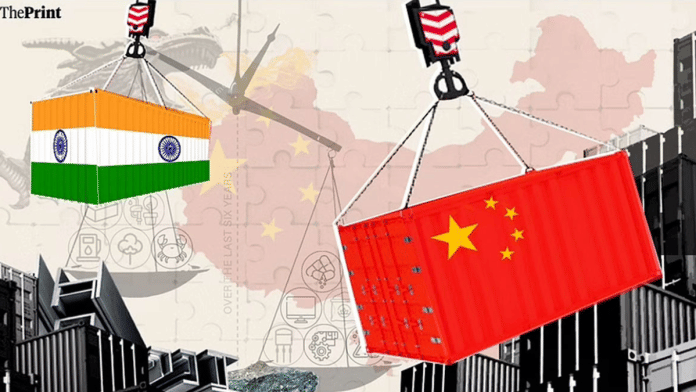New Delhi: Given the domination of China in global supply chains, it may not be a prudent approach to think that India can take over the manufacturing space vacated by China, the Economic Survey 2023-24 states.
The survey, tabled in Parliament Monday by Finance Minister Nirmala Sitharaman, added that to boost manufacturing, India, in fact, may require Chinese investment and technology.
Talking about the ‘Chinese conundrum’, Chief Economic Adviser V. Anantha Nageswaran in the survey said that the dynamics of India-China economic relations continue to be extremely complex and intertwined.
“It may not be the most prudent approach to think that India can take up the slack from China, vacating certain spaces in manufacturing. Indeed, recent data cast doubt on whether China is even vacating light manufacturing,” the survey noted.
It added that India faces two big questions — is it possible to plug India into the global supply chain without plugging itself into the China supply chain? And what is the right balance between importing goods and importing capital from China?
“As countries attempt to reshore and friendshore, India’s policy choices concerning China are exacting,” it noted.
“Dealing with the Chinese manufacturing juggernaut will test the policy mettle of EMDEs (emerging markets and developing economies). Developing countries will have to figure out a way of meeting the import competition from China and, at the same time, boosting domestic manufacturing capabilities, sometimes with the collaboration of Chinese investment and technology,” the survey said.
Emerging economies, it said, are increasingly introducing import restrictions on Chinese goods while pushing for free trade elsewhere to protect their domestic manufacturers. These protectionist measures against Chinese products are aimed at dealing with threats posed by overcapacity in China’s manufacturing sector.
“China’s manufacturing trade surplus has been ballooning since 2019 due to weak domestic demand and expanding industrial capacity. The mismatch between domestic supply and demand in China has widened in the past few years, leading to Chinese companies exploring additional markets overseas. This is leading to prices collapsing globally and driving other national producers out of business, especially in product categories where China dominates,” it explained.
For example, the poor performance of China’s property sector since 2021, has created significant overcapacity, which has resulted in a collapse in global steel prices, putting pressure on producers in India, Vietnam, Brazil, and other countries.
According to estimates given in the Survey, China’s steel product exports are surging again — by 27 percent so far in 2024 — after 35 percent growth last year.
The survey said that while EMDEs are resorting to import restrictions as a policy option to deal with the Chinese challenge, some Chinese goods are so cheap that no amount of tariff can reduce their price competitiveness. Additionally, some Chinese products can move past these restrictions without being noticed since they are packaged in third countries.
Meanwhile, China has started retaliating against these import restrictions which has further complicated the manufacturing landscape for EMDEs. For instance, in response to India’s anti-dumping probe against Chinese entities, China has been quietly blocking India’s access to solar equipment.
“Given this, dealing with the Chinese manufacturing juggernaut will test the policy mettle of EMDEs. Developing countries will have to figure out a way of meeting the import competition from China and, at the same time, boosting domestic manufacturing capabilities, sometimes with the collaboration of Chinese investment and technology,” the survey said.
Research by the Rhodium group shows that Brazil and Turkey recently raised tariffs on the import of E-Vehicles from China but, at the same time, took steps to attract Chinese FDI in the sector. “India has a similar decision to make, given its large bilateral trade deficit with China,” the CEA said in the survey.
“Replacing some well-chosen imports with investments from China raises the prospect of creating domestic know-how down the road. It may have other risks, but as with many other matters, we don’t live in a first-best world. We have to choose between second and third-best choices,” it said.
“In sum, to boost Indian manufacturing and plug India into the global supply chain, it is inevitable that India plugs itself into China’s supply chain. Whether we do so by relying solely on imports or partially through Chinese investments is a choice that India has to make,” the survey noted.
(Edited by Zinnia Ray Chaudhari)
Also read: ‘Tried to stifle PM’s voice’ — Modi slams Oppn ahead of Budget session, says rise above party lines






